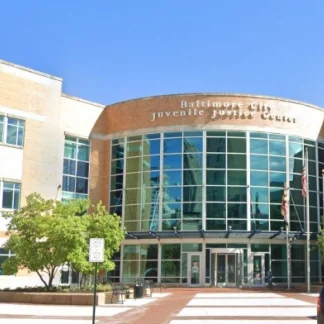The Baltimore Station
The Baltimore Station is an innovative therapeutic residential treatment program...
Baltimore City Juvenile Justice Center is a secure detention facility operated by the Maryland Department of Juvenile Services. Baltimore City Juvenile Justice Center is located in Baltimore, Maryland and offers behavior management programs for boys between the ages of 12-18.
Baltimore City Juvenile Center looks forward to providing accredited vocational and educational programs to contribute to safer communities. Baltimore City Juvenile Center aims to help teenagers become prosperous and influential leaders.
At Baltimore City Juvenile Center all teenagers enrolled receive comprehensive evaluations that include mental and medical health, educational and susbstance abuse screening during admission. They have specialized life skills and anger management programs.
Contact us for more information: (443) 263-8706

Connect with Baltimore City Juvenile Justice Center by calling their admissions team directly.
(443) 263-8706 Website Get DirectionsState Licenses are permits issued by government agencies that allow rehab organizations to conduct business legally within a certain geographical area. Typically, the kind of program a rehab facility offers, along with its physical location, determines which licenses are required to operate legally.
State License: Maryland
Research clearly demonstrates that recovery is far more successful and sustainable when loved ones like family members participate in rehab and substance abuse treatment. Genetic factors may be at play when it comes to drug and alcohol addiction, as well as mental health issues. Family dynamics often play a critical role in addiction triggers, and if properly educated, family members can be a strong source of support when it comes to rehabilitation.
In individual therapy, a patient meets one-on-one with a trained psychologist or counselor. Therapy is a pivotal part of effective substance abuse treatment, as it often covers root causes of addiction, including challenges faced by the patient in their social, family, and work/school life.
Life skills trainings involve all the skills a person must have in order to function successfully in the world. These include time management, career guidance, money management, and effective communication. Truly successful addiction recovery is based on the ability to not only live substance-free, but to thrive. Life skills teaches the practical necessities of functioning in society, which sets clients up for success in life, and therefore sobriety.
In individual therapy, a patient meets one-on-one with a trained psychologist or counselor. Therapy is a pivotal part of effective substance abuse treatment, as it often covers root causes of addiction, including challenges faced by the patient in their social, family, and work/school life.
Life skills trainings involve all the skills a person must have in order to function successfully in the world. These include time management, career guidance, money management, and effective communication. Truly successful addiction recovery is based on the ability to not only live substance-free, but to thrive. Life skills teaches the practical necessities of functioning in society, which sets clients up for success in life, and therefore sobriety.
Life skills trainings involve all the skills a person must have in order to function successfully in the world. These include time management, career guidance, money management, and effective communication. Truly successful addiction recovery is based on the ability to not only live substance-free, but to thrive. Life skills teaches the practical necessities of functioning in society, which sets clients up for success in life, and therefore sobriety.
The Baltimore Station is an innovative therapeutic residential treatment program...
JR Healthcare – Behavioral Health is a private rehab located in Baltimore, Maryl...
Freedom Advocates Celebrating Ex Offenders - FACE is a non-profit rehab located ...
Therapeutic Living for Families is located in Baltimore, Maryland. Therapeutic L...